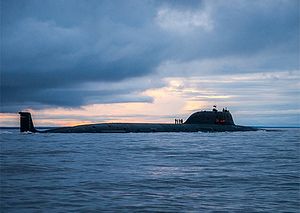The Russian Navy’s first Project 885-M Yasen M-class multipurpose nuclear-powered attack/cruise missile submarine (SSN/SSGN), christened Kazan, is not expected to enter service until the end of 2020 or possibly later due to technical problems that emerged during dockside trials, according to TASS state news agency.
Some of the Kazan’s auxiliary systems have reported failed to meet the Russian Ministry of Defense’s requirements, a defense industry source told TASS on May 17.
“Following the results of dockside trials, and also the winter stage of shipbuilders’ trials [which ended in January], it has been established that some of the ship’s auxiliary sub-assemblies and mechanisms do not meet the requirements of the specifications set by the Defense Ministry, including reliability characteristics, and require finalizing in the Sevmash dock,” the source reportedly said.
The Kazan was originally slated to commence sea trials and live firing tests of its P-800 Onik anti-ship missiles and 3m-54 Kalibr anti-ship/land-attack missiles from submerged positions this summer. However, it will now take several months for the various technical issues with the auxiliary systems to be fixed, according to the report.
“It is absolutely unrealistic to accomplish all this by the end of the year,” the source said. “It is not ruled out that the entire year 2020 will be required and the Sevmash Shipyard will be able to deliver the sub to the Fleet only in 2021.”
The Kazan was launched at the Sevmash shipyards in Severodvinsk, a port city on Russia’s White Sea in Arkhangelsk Oblast, in March 2017. It is the second overall Yasen-class SSN launched by the Russia’s United Shipbuilding Corporation and the first upgraded Yasen M-class submarine. The Kazan conducted its first set of factory and underwater sea trials in September 2018.
Four more Yasen M-class boats are currently under construction, although it is unclear when and if they will ever be delivered to the Russian Navy. “There is reason to believe that [at most] only two more Yasen M-class boats will be completed given the Russian Navy’s depleted budget,” I noted last year. As I explained in December 2018:
The improved Yasen M-class SSN is reportedly quieter than the lead Yasen-class boat. It is built with low magnetic steel to reduce its magnetic signature. The Yasen M-class SSN is purportedly not equal to the United States Navy’s new Virginia-class attack subs. Rather it is technically on par with older U.S. Seawolf-class SSNs, built by the U.S. Navy from 1989 to 2005, although the underwater top speed of the Russian subs is reportedly much lower than that of U.S. boats.
The Kazan is fitted with eight vertical СМ-346 complex (3Р-14В) silos for submarine-launched cruise missiles as well as ten torpedo tubes for firing the 3M-54 Kalibr supersonic cruise missile, the P-800 Onik over-the-horizon supersonic anti-ship missile, and an improved variant of the 533-millimeter Fizik-1 homing torpedo. The Severodvinsk can carry up to 40 Kalibr cruise missiles while the second, Kazan, can carry 32. (The Kazan is approximately 10-12 meters shorter than the first boat.)
The Kazan was originally expected to join the Russian Navy’s Northern Fleet in late 2018.































